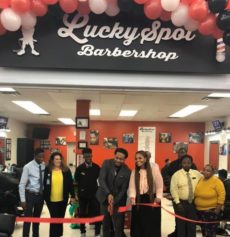Although yoga’s roots run deep in the cultural foundation of India, it has been commodified in the West and stripped of its spiritual element. Yoga studios are planted in affluent zip codes and marketed to privileged people with hefty price tags. Yoga has gained traction in America primarily due to its physical benefits, including strength building, increased flexibility and muscle toning. Although the reverence for the holistic practice’s brown masters and their ancient spiritual philosophies is largely lost on most modern practitioners, Jyll Hubbard-Salk’s studio, Urban Asanas in Brooklyn, seeks to reaffirm the communal foundations of the practice. With affordable $15 classes, donation-based payment for those in need and free mat rentals, Hubbard-Salk is making room in the yoga world for those who need it most.
Deeply Rooted
The last of her parents’ three children, Hubbard-Salk was born in Canton, Ohio. The self-described tomboy was raised by “old school” parents who took their children to family reunions and insisted they were in the house before the streetlights flickered on. She nurtured a passion for sports and was active in cheerleading and track and field throughout high school, utilizing her nearly 6-foot frame as an advantage.
At first, Hubbard-Salk stayed close to her roots. She attended Kent State University, a mere 40-minute drive from her hometown. When her parents revealed their plans to divorce after 25 years of marriage, she transferred to Jackson State in Mississippi. After receiving her degree, Hubbard-Salk interned with a congressman. There, she was offered the opportunity to work in France on a three-month visa. With a spirit craving adventure and years of French study under her belt, she figured she had nothing to lose.
“I thought, ‘F— it, let’s go!’ So I went, I lived. And it was one of the best experiences of my life. … Sometimes when opportunities come to your door, you just have to proceed,” Hubbard-Salk said.
After a little over a year in Paris, the free-spirited traveler moved to London and spent some time there before heading back stateside to Mississippi. There, she flirted with graduate school for a time, but she soon met a former partner and they moved to Houston. At the time, he was on parole and made his money by selling drugs. His arrest prompted Hubbard-Salk to reconsider her path. Her intuition told her that if she stayed in Texas, she would meet his fate or worse.
Coming Home to Yoga
So, Hubbard-Salk fled to a city that is as vibrant and bold as she is — New York. There, her brother Gregg welcomed her to his East Village community. Gregg Hubbard, a talented dancer, had been working with Bill T. Jones, who is most well-known for writing and choreographing “Fela!” on Broadway. One fateful day, Gregg invited her to a yoga class that his friend had been leading. At that 7 a.m. session, the foundation for Hubbard-Salk’s future was set. From the moment the lithe, 20something got into the flow, it was love at first stretch. She had found a home on the mat, a place that made her feel strong.
This was 30 years ago, meaning Hubbard-Salk was practicing yoga long before celebrities made it a thing. Years before Russell Simmons sat in lotus pose and extolled the virtues of meditation and yoga to the general public, Hubbard-Salk had been at it. Typically, she was the only Black woman in the studios. Armed with a fierce confidence, the yogi was not deterred by the lack of diversity, it only intensified her drive to make more room for herself.
Despite the lack of representation in the yoga world, Hubbard-Salk had always been taught by nonwhite yogis. Her first yoga instructor was Brazilian. Her next was Colombian. When the time came for her to train to become a certified instructor, she trained in the Hatha Yoga discipline and later studied Iyengar yoga, pioneered by B.K.S. Iyengar.
Urban Asanas: A Lotus In Concrete
After becoming a certified instructor, Hubbard-Salk taught classes at Shambhala in Brooklyn. Her sessions were consistently full. She took some time off after giving birth to her second daughter but was asked by the previous owner to return early due to the high demand for her leadership. Hubbard-Salk realized that she had created a special niche that people loved. She had gained a following. When the owner opted to sell the studio, Hubbard-Salk knew it was time to look for a space of her own.
With the support of her husband, Hubbard-Salk saved $20,000, obtained a bank loan and launched Urban Asanas with no investors.
“When, I first opened my studio in Crown Heights, I did not intend to make it exclusive for Black people,” she said. “It was meant to be a safe space where people could come and [practice] with someone who looked like them. … I am giving you realness.”
As her reputation spread, even more followers came. The vivacious yogi’s classes got more and more crowded. On May 1, 2017, Hubbard-Salk announced that she was preparing to move Urban Asanas to a larger studio space — 843 Sterling Place. Now, there is plenty of room, even enough for a live DJ who spins on Friday evenings during a Vinyasa flow class. Hubbard-Salk’s perfect ratings on Google Reviews and Yelp! are a testament to her mastery, authenticity and the necessity for more Black yoga masters. This yogi has managed to retain loyal practitioners who first came to Urban Asanas over 10 years ago. She’s watched many of her students live, grow and evolve through their practice.
When asked what’s next for the dynamic yoga master, Hubbard-Salk said, “I want to tap into the Black girls, the single parents, people who don’t get yoga … into young women who [need a sense of] self worth. That’s what I want to penetrate next.”
To contact Jyll or support Urban Asanas, visit UrbanAsanas.com.


